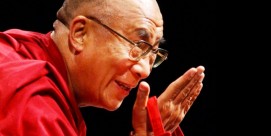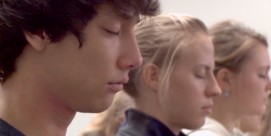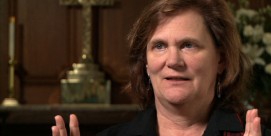Zen Convert
BOB ABERNETHY, anchor: Every year in New York’s Central Park, the Buddhist magazine TRICYCLE sponsors a demonstration of Buddhist practices called “Change Your Mind Day.” That refers not to conversion but to exploring ways to become more mindful, more fully aware, and to meditate. We talked with Jane Smith, an architect, about the kind of Buddhism she practices — Zen.
JANE SMITH: I grew up in the Roman Catholic tradition and loved it. But then, when I came to New York, I thought, I’ve got to figure out a way to be able to handle these stresses that I’m taking on. And so I started thinking, what can I do in order to release the tension and yet still be able to embrace the joy of doing what I really love to do, which is the architecture and the creative skills and the challenge of being in an intense workplace and taking on New York? So I really went on a quest.
The Zen practice and the Buddhist tradition [are] based on nature and space and simplicity. It really was life-changing, mind-changing for me. One of the big differences for me between the two traditions is the idea of how we’re born. In the Western tradition, there is the idea of original sin. The Eastern tradition comes from the point of view that we’re born perfect, and every moment is really complete and perfect.
Now my practice is part of my day-to-day life. I get up very early in the morning, and I sit for a half an hour with my legs crossed.
When you do meditation practice, there’s a lot of pain. You’re sitting there cross-legged, which is not a Western way of sitting. You look at the pain in the knee, and you witness: “That’s pain in my knee.” It’s really amazing that, as you look at it in this kind of nonjudgmental, not clenching around it, freaking out [way], it starts releasing.
And that’s the same thing with our thought. Things come up — the stresses that are coming up through the day. But as something comes up, the practice is to allow it to be there, like the clouds that move overhead. The clouds come and you see them and then they pass away. And so if an anxiety comes up, I look at it, and by looking at it, it really — it diffuses and moves on. And then I have a moment of — and maybe it’s a small moment — of just peace and relaxation. But it clears my head. It makes me realize again what’s important to me in life: being aware of every sound and everything that’s going on around you. And as you do that, you let go of the difference between yourself and the other things out there. You become the sounds on the street. But, again, it doesn’t last, because we’re in our human nature. And our human nature is to keep pushing ourselves down, being really tough on ourselves. And I’m, you know, boy, I’m big on that one.
How do you not be a bystander in your life but … be an active participant in your life? What I get from Zen Buddhism is the ability to live this life, this moment, now. To really appreciate everything as it happens in front of me and to be able to have the tools to embrace it. That’s it; that’s it for me.








